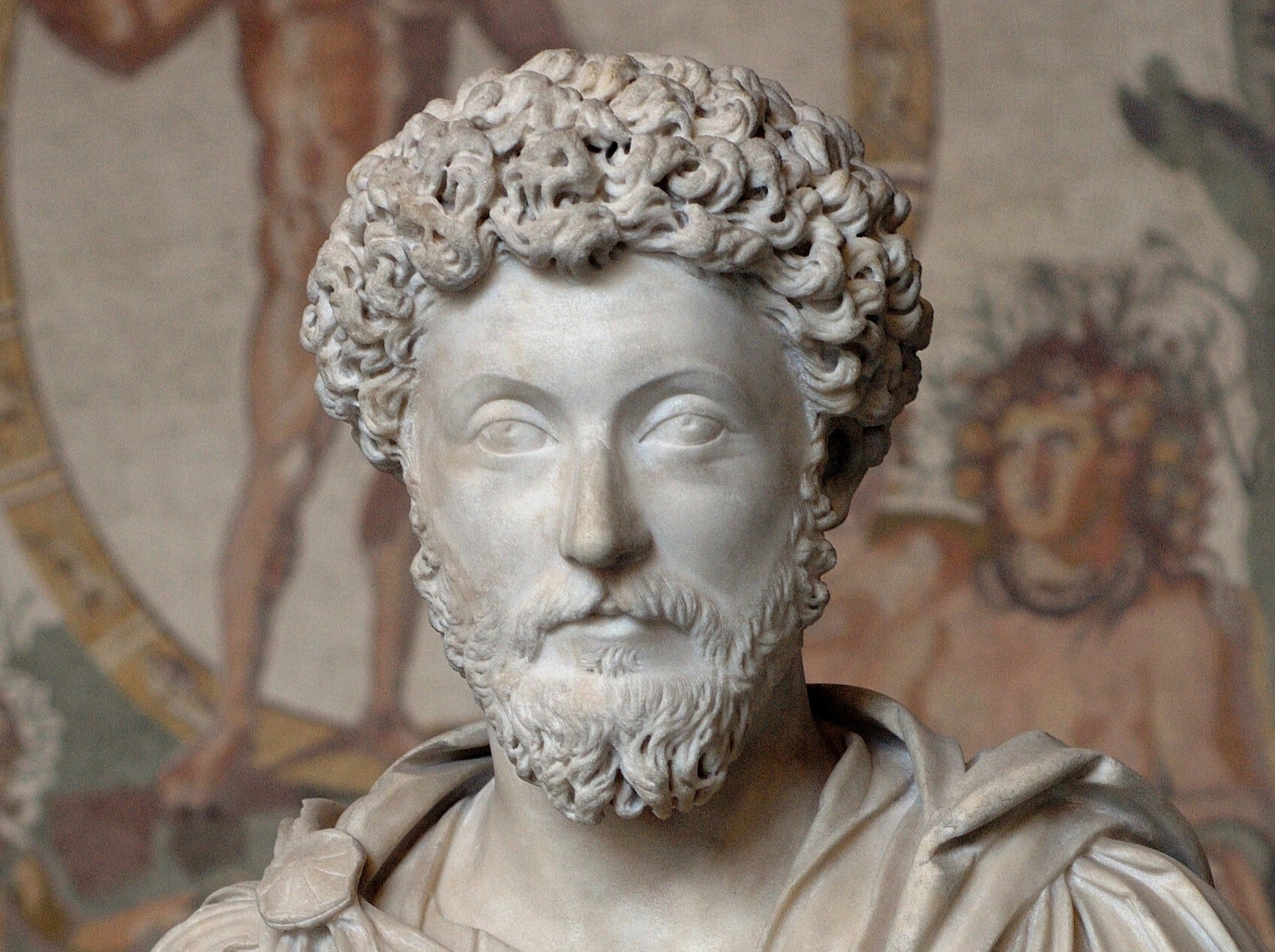Bust of Marcus Aurelius.
Marcus Aurelius, the Roman Emperor from AD 161 to 180, is often referred to as the “philosopher king”. His reign was marked by wisdom, virtue, and a commitment to Stoic philosophy.
Marcus Aurelius was born in Rome on April 26, AD 121, His birth marked the beginning of a life that would leave a significant impact on the world, both as a Roman Emperor and a Stoic philosopher.
Marcus Aurelius was adopted by Emperor Antoninus Pius and received an excellent education in rhetoric, poetry, Greek, Latin, and philosophy. He ruled with integrity, emphasizing virtue and service to the state. Despite challenges, he remained consistent in his character throughout his life.
His personal journal, Meditations, reveals his innermost thoughts and how he used Stoic philosophy for self-improvement. Meditations is a collection of personal writings, covering topics such as the nature of the universe, the importance of virtue, and the best way to live one’s life. It is considered one of the greatest works of philosophy, and it provides a unique insight into the mind of one of the most powerful men in history.
Stoicism is a school of Hellenistic philosophy that flourished in Ancient Greece and Ancient Rome. It was founded in the ancient Agora of Athens by Zeno of Citium around 300 BC. The Stoics believed that the practice of virtue is enough to achieve eudaimonia, a well-lived life. They identified the path to achieving it with a life spent practicing the four virtues in everyday life wisdom, courage, temperance or moderation, and justice, and living in accordance with nature.
The Stoics are especially known for teaching that “virtue is the only good” for human beings, and that external things, such as health, wealth, and pleasure, are not good or bad in themselves (adiaphora) but have value as “material for virtue to act upon”. Many Stoics — such as Seneca and Epictetus — emphasized that because “virtue is sufficient for happiness”, a sage would be emotionally resilient to misfortune.
The Stoics also held that certain destructive emotions resulted from errors of judgment, and they believed people should aim to maintain a will (prohairesis) that is “in accordance with nature”. Because of this, the Stoics thought the best indication of an individual’s philosophy was not what a person said but how a person behaved.

Stoicism and the Military
Stoicism influenced Marcus Aurelius significantly. Stoics believed in fate, reason, and self-restraint. These principles guided Marcus in both personal life and governance. While not all soldiers read Stoic texts, the philosophy’s emphasis on endurance, resilience, and duty resonates with military training.
His reign as the Roman Emperor was marked by significant military campaigns, most notably the Marcomannic Wars. The Marcomannic Wars were a series of conflicts that lasted from about 166 until 180 AD. These wars pitted the Roman Empire against principally the Germanic Marcomanni and Quadi and the Sarmatian Iazyges. The wars took place along both sides of the upper and middle Danube, the northeastern European border of the Roman Empire.
Marcus Aurelius led several successful campaigns against these tribes, securing the northern borders of the Roman Empire and ensuring its stability and security. Despite being a man of peace and philosophy, Marcus Aurelius proved to be a capable military leader. Even in the face of challenges, he demonstrated skillful leadership, ensuring the security of Rome’s borders and the empire’s stability.
His Stoic philosophy was not just theoretical; it was tested in the crucible of war. Stoicism, with its emphasis on virtue, endurance, and acceptance of things beyond one’s control, provided a framework for Marcus Aurelius to navigate the complexities and hardships of war. He saw war as an opportunity to practice virtue, to develop courage, wisdom, and justice in the midst of challenges and adversity.
In the face of war, Marcus Aurelius demonstrated that it was possible to be both a philosopher and a soldier, a thinker and a doer. His life and leadership during the Marcomannic Wars stand as a testament to the practical application of Stoic philosophy in the face of real-world challenges. His writings, particularly his personal journal Meditations, provide a unique insight into how he applied Stoic principles to his life and leadership.

Cosmopolitan Outlook
Marcus Aurelius considered himself a citizen of the world (cosmopolitan). His goal was to become the most virtuous person he could be, transcending national boundaries and caring for humanity as a whole. This cosmopolitan outlook is a key aspect of Stoic philosophy. The Stoics believed that all people are fundamentally the same, and that we should care for each other as fellow members of the human community.
Final Thoughts
Marcus Aurelius stands as a unique figure in history, embodying the principles of Stoic philosophy while leading the Roman Empire through significant military challenges. He exemplified the Stoic warrior ideal, combining wisdom, duty, and resilience in his leadership.
His legacy continues to inspire those seeking inner strength and ethical living. His life and philosophy remain relevant today, offering timeless wisdom on how to live a good life. Marcus Aurelius, the philosopher king, serves as a shining example of the power of philosophy to guide us in our daily lives.
*The views and opinions expressed on this website are solely those of the original authors and contributors. These views and opinions do not necessarily represent those of Spotter Up Magazine, the administrative staff, and/or any/all contributors to this site.

